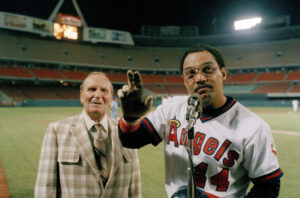Gene Autry: How America’s ‘Singing Cowboy’ Brought the Angels to Southern California in 1961
The Los Angeles Dodgers are wildly popular and successful. They share the LA market with a second team, one which is less iconic, for sure. But the heritage of the Los Angeles Angels is woven into the story of one of America’s most successful movie stars and singers.
Without the temerity and media savvy of Gene Autry, the Angels probably never would have been born.
With the news that current Angels owner Arte Moreno may soon sell the franchise, we figured now was a good time to look back at the legend of Gene Autry, America’s “Singing Cowboy”-turned-revolutionary Major League Baseball owner.
ANGELS OWNERSHIP: If Arte Moreno Sells, Here Are 10 Candidates to Be the Next Angels Owner
The Gene Autry Story: Building a Media Empire
Autry was always looking ahead, and that meant being aware of the latest technology and trends. He started as a telegrapher on the railroad in Oklahoma when he was 18 years old. In that job, he learned the importance of electronic communication.
That led him to pursue radio as that medium emerged in the 1920s. He found his way to New York, where he auditioned as a singer for radio programs desperate for talent. Soon, he was appearing at least five times a day, signing country tunes. He was dubbed the “Yodeling Cowboy” and became popular.
In 1929, Autry signed his first recording deal, and in the 1930s he translated his popular songs to film. Eventually, “the Singing Cowboy” appeared in more than 100 movies. He wrote more than 300 songs and recorded more than 600 in his long career. His biggest hits were “Here Comes Santa Claus,” “Frosty the Snowman,” and “Rudolph, the Red-Nosed Reindeer” — three of the most iconic Christmas songs of all time. The recordings made him tremendously wealthy.
With his music and film careers vaulting him to superstar status, Autry used his wealth to purchase radio stations, and later became an early investor in television. By the 1950s, he owned one of the country’s most expansive and valuable media empires.
But he never forgot one of his first loves: baseball.
CA SPORTS BETTING: Here Are All the Groups That Support Prop 26 and Prop 27, and Why
MLB Seeks Out Autry to Bring American League Team to LA
As a child in Texas in the 1910s, Autry had played baseball and also been a fan of the game. He tried and failed to become a professional ballplayer, but never ceased in his love affair with the game.
In the 1950s, Autry held partial ownership of the Hollywood Stars, a minor league franchise in the Pacific Coast League. In 1959, the Brooklyn Dodgers relocated to Los Angeles, and that triggered Autry to pursue a role in MLB.

At first, Autry’s radio station empire held the rights to broadcast Dodgers games. But in 1960 that contract expired, removing valuable programming. Almost immediately, the old cowboy started to look for another way to have baseball on his channels.
In 1960, when the American League expressed interest in placing a team in the LA market, they approached Autry to become involved. The Singing Cowboy thought the league wanted him to handle broadcast rights, but instead they courted him to become majority owner.
“Only one man knows how to make a second baseball team successful (in) Los Angeles,” AL President Joe Cronin said at the time.
Autry and his partners had to pay $350,000 to Dodgers owner Walter O’Malley for the rights to the Los Angeles Angels name. But once they did, they were approved for an expansion franchise in Los Angeles to begin play in 1961.
The Angels, wearing caps with a gold halo stitched to the crown, debuted in 1961. The team defied expectations for a first-year team, winning 70 games and finishing eighth in a 10-team league. The following season, with Autry watching nearly every home game from his seats near the dugout, the Angels won 86 games and finished in third place, an unprecedented result for such a young franchise.
In those first years, the team was better than most could have expected. But the ballpark was also a reason for celebration. Autry used his genius in broadcasting and media to promote his team. Even as the Dodgers outdrew his franchise at the gate, the Angels got great publicity through a powerful radio signal. Autry’s connections helped some of his players get parts in Hollywood movies, too. The Old Cowboy also pioneered the mass usage of television to promote his team.
EXCLUSIVE SURVEY: 90% of California Sports Bettors Think All Sports Fans Want Legal Sportsbooks
The First Wrigley Field: Home of the Angels
Two legendary baseball men were at the center of the Angels becoming an MLB team. First was Autry, the wildly popular, cowboy-hat-wearing owner with the crooner’s voice. Then there was Phil Wrigley, heir to a chewing gum fortune and owner of the Chicago Cubs.
Wrigley owned the ballpark in Los Angeles that was home to the Los Angeles Angels. But in order to have a place to play, Autry needed to buy out the property. He accomplished that in time for opening day in 1961, and the park maintained the history it had accumulated since opening in the 1920s. It also served as an inviting playground for home run hitters.
The Sporting News called LA’s Wrigley Field “a picnic for American League sluggers” because of the small outfield dimensions. It played that way. In 1961, the team hit 189 homers, the second-most in the league, with 122 of them coming at friendly Wrigley.
The first Angels home park was named Wrigley Field in 1925, a year before Cubs Park in Chicago was christened the same. And in another kick to the pants to Cubs rooters: The West Coast Wrigley Field had ivy before the one in the Windy City. It also got lights in 1930, 58 years before Chicago’s Wrigley finally flipped the switch and played a night game.
The popular “Home Run Derby” television show was filmed at Wrigley Field in 1959. That series pitted two of baseball’s best hitters each episode in a home run challenge in the sun, captured in the offseason. Hank Aaron, Mickey Mantle, and Willie Mays were a few of the legends who took part.
‘Win One for the Cowboy’
For years, when Autry was a retired millionaire, he was so well respected by the players on the team that a battle cry frequently heard in the clubhouse was, “Win One for the Cowboy.”
In 1977, when MLB’s free agent system emerged, Autry was the first owner to open his wallet to lure superstars to play for his team. He signed Don Baylor, Bobby Grich, and Joe Rudi to million dollar contracts, sending shockwaves through the sport. Before George Steinbrenner earned a reputation for spending on ballplayers, Mr. Autry was the OG.
“I want to win a title for Mr. Autry,” Reggie Jackson said in 1982 when he inked a five-year, $6 million free agent deal with the Angels.
WORST-CASE SCENARIO: If Prop 26 and Prop 27 Both Fail, What’s Next for California Sports Betting?
In spite of his generous spending, Autry’s beloved Angels failed to win a pennant even with star-studded rosters. In 1979, they lost in the playoffs, and in 1982 and 1986 they squandered leads in playoff series. The 1986 team was one strike away from going to the World Series, but failed to finish off the Boston Red Sox in the ALCS.
Autry died in 1998 at the age of 91. He had owned the Angels for 38 years, beginning from its infancy. He did not live long enough to see the franchise win its first World Series title in 2002.
Even today, “Win One for the Cowboy” can be seen at Angels Stadium, or heard in the form of a jingle played at the ballpark to spur on the Angels.
